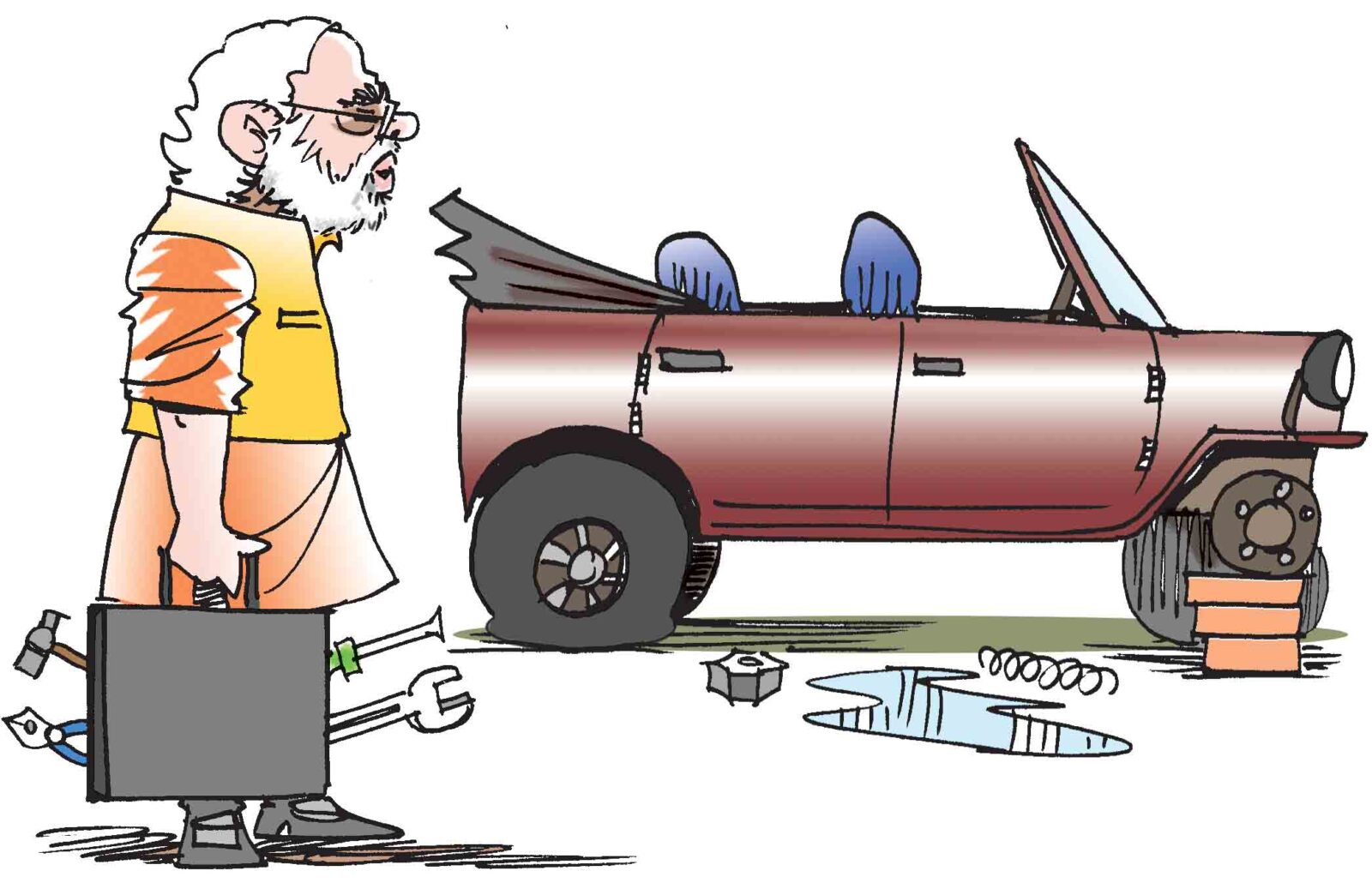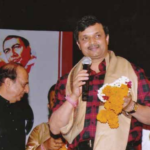- Cover Story
- Governance
- Globe Scan
- Corruption
- State Scan
- Talk Time
- Cover Story
- Governance
- Globe Scan
- Corruption
- State Scan
- Talk Time
Recent Posts
© Copyright 2007 - 2023 Gfiles India. All rights reserved powered by Creative Web INC. Written by MK Kaw
Written by MK KawA few days ago, when the exit poll figures were being touted from the housetops, one morning, around 4 a.m., I had a vivid dream. I dreamt that the NDA had won five-sevenths of the seats in the 16th Lok Sabha. Narendra Modi was so euphoric that he decided to request the President to allow the new Council of Ministers to take their oath of office at Nagpur, in the benign presence of the Sarsanghachalak of the RSS.
I dreamt that Sonia Gandhi had run away to Italy and that Rahul Gandhi was married to his foreign sweetheart at last. That we now had a Congress party not led by the Dynasty. And so on and so forth.
Then, on May 16, as I watched the actual results unfold on the TV, I found that my dream was closer to reality than all the exit polls, howsoever liberal those estimates were. It also turns out that the top brass of the BJP called on the Sarsanghachalak to take his advice on government formation. Sources were quoted as saying that the Sangh expected the government to consult the Sangh Parivar on various issues.
Sonia has not yet run away to Italy. But Rahul did disappear suddenly for a few days and spent them in London. Whether he met his alleged fiancée or not has not as yet come to light. Perhaps we will have to wait till Subramanian Swamy decides to spill the beans.
So Sigmund Freud was not so far from reality when he said that dreams are a good clue to reality or what we have absorbed of it.
Throughout the day, the top psephologists, party spokespersons and journalists tried to understand what had happened. Some things were pretty obvious. UPA II had committed too many blunders. It had been beset by scams. While Sonia thought she had perpetrated a coup of sorts by choosing Manmohan Singh as a natural scapegoat, she forgot that even a scapegoat has to have a tongue. Sonia and Rahul mistakenly thought that all the opprobrium was getting deflected onto the PM. They forgot that everyone knew who was calling the shots. In the process, the mud made their faces look blacker and blacker.
Inflation was the other major problem. It hurt the common man very badly. Probably the high command was insulated from the price rise and did not feel the heatso much.
The real difficulty stemmed from the fact that Rahul had not been properly groomed for electoral politics. Sonia did not profit from Indira’s example. She should have inducted Rahul into the Cabinet in 2009 itself; first as a Minister of State, then as a Cabinet Minister. Even Youth Services and Sports or Information and Broadcasting, or Culture would have sufficed. Such an experience would have helped Rahul grasp the nitty-gritty of government.
In retrospect, one can see what a masterly strategy was used by Modi to win the election. He used enormous sums of money to go around the country by helicopter. The party spent colossal amounts of money to gather the crowds.When Modi was announced as the BJP’s prime ministerial nominee, Sonia’s response was tepid. When Rahul was quizzed on this, he took the traditional plea that the Congress believed in following the Constitution, and that India did not have a presidential form of government. The result was that Modi started his campaign way back, with no rivalin sight.
In retrospect, one can see what a masterly strategy was used by Modi to win the election. He used enormous sums of money to go around the country by helicopter. The party spent colossal amounts of money to gather the crowds. Crores of rupees were spent on print media, electronic media and social media. Convenient stories were planted through paid news and advertising. Teams of experts coined popular jingles, slogans, songs, which spread like wild fire. Short and pithy slogans like “Modi, Modi” or “HarharModi” or “Namo, Namo” were popularised.
The persona of Modi helped. He has a portly body with large arms with which he would make eloquent gestures. He changed his clothes often and wore designer kurtas and waistcoats, of varying colours and designs. He has the natural gift of the gab common to all pracharaks of the RSS (witness the Atal Behari Vajpayee style), which is a heady amalgam of wit and humour, satire and sarcasm. He talks to the crowds in an easy informal style, as if he is part of them. If they raise slogans, he listens with a smile on his face, then asks them if they have finished and whether he has their permission to speak his piece.
As the campaign progressed, Modi’s repertoire became richer. He started by lampooning the shehzada, contrasting him implicitly with himself, a poor chaiwala’s son, and ended up making fun of sister Priyanka who was trying to help her brother and Sonia, who like any affectionate mother wished only to see her son settled in a proper career.
When Mani Shankar Aiyar ridiculed his chaiwala origins, he dramatised the whole thing by creating thousands of chai chaupals across the country where the BJP served free tea to the masses and people could talk about Modi.
Sometimes he overdid the drama. Priyanka said something about neech. He accused her of criticising his OBC origin, of which he was proud.
In the midst of all this, Modi projected himself. He had no family, no children, no parivar. He lived alone, worked 18 hours a day, wasa mazdoor and a chowkidar. Thelast ounce of strength in his body and his last breath was consecratedin the service of the people andthe country.
He projected his achievements as a Chief Minister. Gujarat had its own model of development. People enjoyed electricity 24×7. Farmers got water 24×7. Employment had risen. People from other states came to Gujarat for jobs. There had been no riots in the last 12 years. He believed in inclusive governance. People of all religions and castes were happy and prosperous in his state.
ON top of it all, Modi sold dreams to the people. He would give them jobs, money, housing, food, water, power, prosperity, opportunities for advancement, the works. They had tried the Congress for 60 years. He requested the people to give him also a chance, just for 60 months. Was it too much to ask?
As his helicopter crisscrossed the vast plains of India and he spoke indefatigably to mammoth audiences, the impact started showing. People openly confessed that they were for Modi. They did not bother about the party which fielded him. Modi was their choice.
Meanwhile, the media onslaught also helped. Each channel started asking whether there was a Modi wave sweeping the country. The wave gradually became a tsunami, an avalanche. Words failed the anchors. This was a phenomenon that they were unable to capturein words.
Today, all the predictions have been proven correct. What many of us thought was hyperbole has been converted into reality. Throughoutthe day, there was euphoria. Was this the birth of a new Republic? Was it the day of real independence? Many speakers hailed the end of the Dynasty. Many announced the demise of the Grand Old Party. Many said that Modi had surpassed the defining politics of the mandir and mandal. India had come of age. It would never be the same again.
Let us wait and watch. The truth about India is that the more it seems to change, the more it remains the same. Modi’s task is not simple.
He has to keep the party veterans happy and the Sangh Parivar at bay. He has to develop industry and trade, without falling prey to crony capitalism. He has to speak less, and act more. He has to promise less and deliver more.
I know that in a few days’ time, I shall see another vivid dream. It will predict the shape of things to come. I shall certainly share the contents of my vision with all of you.
MK Kaw is a former Secretary, Government of India
Recent Posts
Related Articles
Silly PointA tale of two handkerchiefs
Written by MK Kaw Narendra Modi is a leader of the grandiloquent gesture....
ByMK KawNovember 8, 2018Silly PointSilly Point : A new slogan on Kashmir
Written by MK Kaw IT was with a sense of déjà vu that...
ByMK KawOctober 14, 2017Silly PointSilly Point : Blessed are the poor
Written by MK Kaw THE cognoscenti who keep a sharp lookout on national...
ByMK KawSeptember 15, 2017Silly PointSilly Point : The Chinnamma drama
Written by MK Kaw WE in the Aryan belt of India are lucky....
ByMK KawMarch 9, 2017 - Governance
- Governance





























































